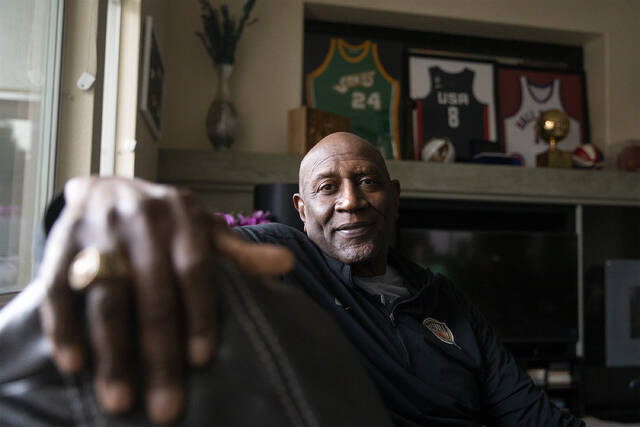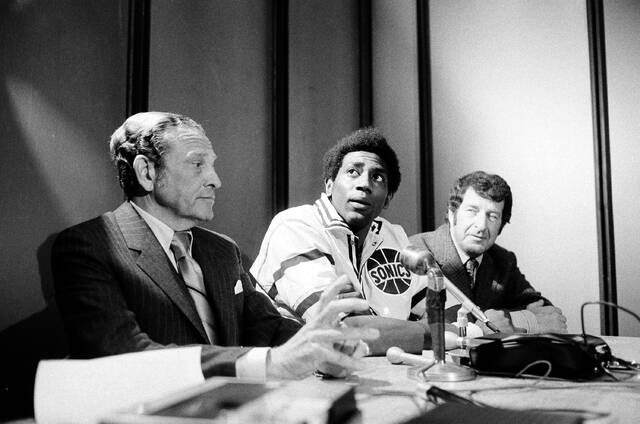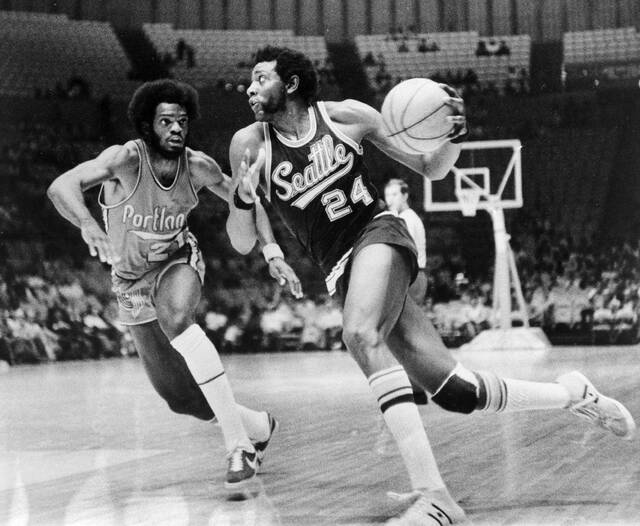


LAS VEGAS (AP) — (Editor’s Note: As part of its 75th-anniversary celebration, the NBA compiled a roster of 75 players who, according to the league, were “selected for being pioneers that have helped shape, define, and redefine the game.”
Missing from that list was Spencer Haywood, the trailblazing forward who grew up picking cotton in Mississippi and wound up reshaping the league in a way that many take for granted today. With the help of the owner of the Seattle SuperSonics, Haywood sued the league, which had a rule that didn’t allow players to enter the NBA until their high school class graduated college. The case went to the Supreme Court, which in 1971 decided in Haywood’s favor, opening the door for players to enter the league sooner than four years after graduating high school.
The rule has been informally known as the “Hardship Rule,” the “Early Entry Rule,’ and, in modern times, the “One and Done Rule.” Haywood would like to see the NBA formally name it the “Spencer Haywood Rule.”)
The 72-year-old Haywood is living in Las Vegas. He sat down with The Associated Press to discuss different parts of his journey. Below are excerpts from that conversation:
HAYWOOD: “The road that I traveled starting with this Supreme Court case, I feel gratitude. And to see that 44 of those 75 players made it to the league under the ‘Spencer Haywood Rule,’ even though I’m not on the list, that’s OK. I don’t feel slighted, because the choices are what the choices are. But it’s a great thing for the NBA, for basketball.
And mind you, for Black players and European players and white players in America, this has been an opportunity to take their families from poverty to richness, and not for just the individual players. Because every time one player comes in, he brings in a hundred of his family and other people along for the ride. It’s just an awesome thing to see and do — to be alive, to be a part of it, even if I’m not on that floor with the 75.
I can’t be too resentful, because without the NBA, I wouldn’t have this home I live in. My daughters are well-educated doctors. I’ve had two great marriages. My family was taken out of poverty and re-educated, really lived another life that they have spun for their kids and grandkids and great grandkids.
So, just thinking about 75, it means the same thing to the Erving family, to the Gervin family, to the Issel family. And I’m just calling up guys from the ABA because I’m a little partial. But then I’ll go to the NBA guys. To see LeBron’s family and Carmelo Anthony coming out of Baltimore and see how these players have risen from the ashes. And I look at Luka (Doncic) and Joker (Nikola Jokic), those guys coming from the Eastern Bloc, where they have been in turmoil and war and famine and just madness. And then you see them throughout Africa, the players coming out of that region with no hope. And the NBA has provided them with all this wealth and a sense of dignity and pride. It is a special time to celebrate.”
___
Haywood played one year for the Denver Rockets of the ABA, which didn’t have the same early entry rules as the NBA. But after receiving a contract extension with most of the money deferred, he decided to make a move to the NBA. Sonics owner Sam Schulman and most of the legal team that took Haywood’s case to the Supreme Court were Jewish.
HAYWOOD: “You also have to touch upon the Jewish ownership, because if I had had another type of owner in Seattle, I don’t think my case would’ve gone the way it did.
The Jewish owners were the ones who could go in for a Black player and bring him in and then stand up for him because they had history. And that’s what the NBA is about, is that history, as well.
So, yeah, it took chutzpah to go to the Supreme Court as a 20-year-old. Not just for me. Sam Schulman was my leader and the owner of the Sonics, and he put his whole franchise in jeopardy. Because he wanted to do what was right by this young kid and everybody was saying, ‘Sam, you’re nuts.’ And he said, ‘One thing you’re going to learn from me, Spencer, is Jewish loyalty. And when you, when you pay back, I want you to go to Israel.’ And I’ve been five times.”
___
Haywood, who helped the U.S. win a gold medal at the 1968 Olympics, has watched with trepidation as many of today’s sports stars have moved away from the days of “Shut up and play,” and begun using their platform to speak out about social issues and racism. He is a past chairman of the National Basketball Retired Players Association and has fought to obtain health care and other benefits for retired players.
HAYWOOD: “Because I went through so much stuff, I’m kind of fearful for those players. I’m not an anti-protest guy, but I’m fearful for those players because I’ve lived it. I know it’s the right thing to do. But spending a lot of time with (1968 Olympics protester) John Carlos, we talk a lot. You don’t want all that (baggage) on your players. But I know what they are doing. I get nervous with LeBron James’ stance. I don’t know why. I guess it’s the potential backlash and somebody acting silly and doing something stupid. I worry.
I do think they should have some obligations. But maybe the Michael Jordan school kind of set me back a little bit because he and Magic and all those guys, they never did take any stance. They were just focused on basketball. And I always thought, ‘What if I had been able to do like those guys?’ Well, I would have had a great life. I would be in this 75, But that’s selfish and stupid, you know? They’re under the Spencer Haywood rule, as well. And if I hadn’t done what I did, maybe none of this would have happened.”
___
Haywood remains puzzled as to how someone who had the impact he had on the league, while also averaging 19 points and nine rebounds over a 13-year career, is not placed among its foremost 75 players. He wasn’t inducted into the Naismith Hall of Fame until 2015. Later this winter, he’ll head to Cleveland for the All-Star game and the celebration of the anniversary, but he says he’ll feel a bit like the crime boss in the 1995 mystery thriller “The Usual Suspects,” whose name people were reluctant to speak.
HAYWOOD: “I feel like Keyser Söze. That’s me. Because they can’t say my name. They can’t say anything about what I did or anything. It’s weird. When you look at the grand scheme of things, the 75 is coming up, and you can’t say his name. All these players are up here, and a lot of them are up here with my help, but you can’t say it.
But being bitter or angry, it doesn’t wear well with me. I can’t be angry. I’ve got too much to be grateful for.”
___
More on the NBA At 75: https://apnews.com/hub/nba-at-75
___
More AP NBA: https://apnews.com/hub/NBA and https://twitter.com/AP_Sports




